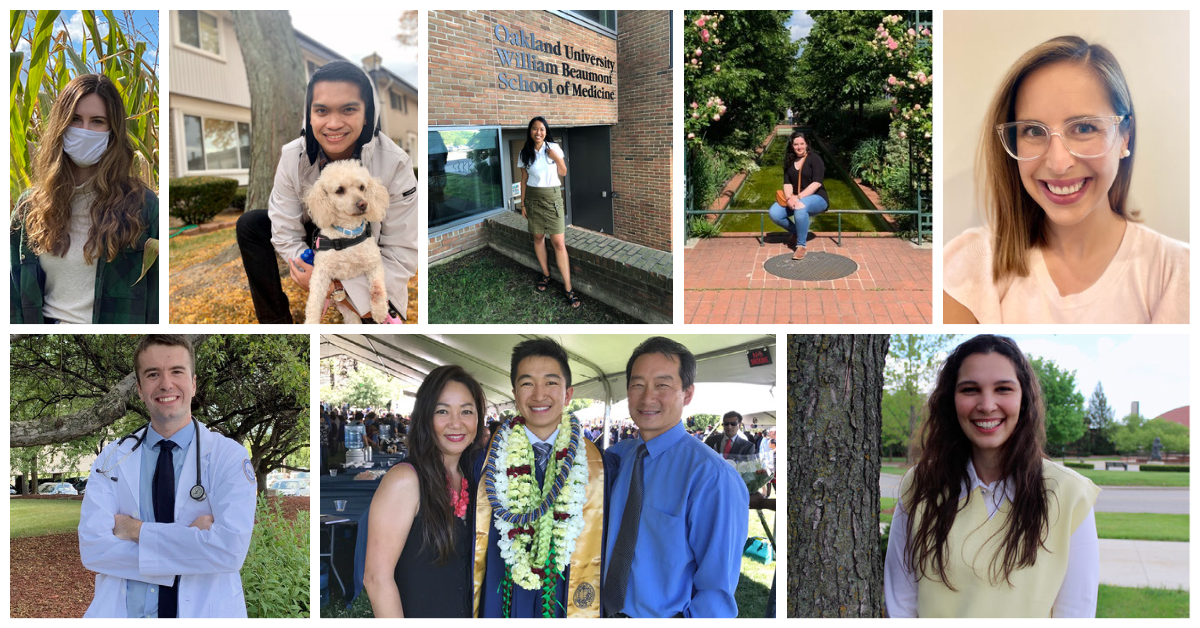
An Oakland University William Beaumont School of Medicine student interest group is leading a mental health campaign intended to address the impact of the recent hate crimes targeted against the Asian American community.
The Asian Pacific American Medical Student Association (APAMSA) at OUWB created the campaign entitled “Fighting the Virus. Fighting the Bias.” The campaign is open to the entire OUWB community and runs through May 26.
The campaign features members of the OUWB community sharing answers via AMPAMSA's Facebook page to three questions: How do you feel about the recent hate crime or how has it been affecting you; What changes would you like to see that will address the issues surrounding the recent hate crimes; Do you have any positive advice or tips on how you have endured the past year or for any Asian Americans affected by these tragic events?
APAMSA annually conducts a mental health campaign held in conjunction with May’s Mental Health Awareness Month and Asian American and Pacific Islander Heritage Month.
“APAMSA tries to focus on the various health disparities and issues that predominantly affect the Asian American community and one of these is mental health,” said Jenny Nguyen, rising M2 and vice president of APAMSA at OUWB.
APAMSA is a national organization of medical and pre-medical students committed to addressing the unique health challenges of Asian and Pacific Islander American (APIA) communities. The OUWB chapter has more than 50 members.
The organization serves as a forum for student leaders to engage these health issues and develop initiatives and projects addressing those needs. The local, regional, and national activities of APAMSA aim to promote the health of the APIA community and help health care workers understand how to care for APIA patients in a culturally sensitive manner.
APAMSA also provides an important venue for medical students to meet, exchange experiences, and develop personally and professionally through leadership and service.
Nguyen said having a mental health campaign for the Asian American community is especially important because “as someone who grew up in an Asian household, mental health and illness isn’t really talked about.” She called it a “silent struggle.”
“It’s kind of always pushed aside,” she said. “There’s a lot of stigma around mental health and I’m sure it affects other ethnic groups, as well.”
Michael Ko, rising M2 and president of APAMSA, added that mental health in the medical field is “something that gets pushed to the side in terms of things that are focused on.”
“With APAMSA not only being for the APIA community but also for medical students, we feel that it’s a match made in heaven in terns of putting a focus on something that’s important for both communities,” he said.
With its campaign, Nguyen said APAMSA aims “to bring awareness and a safe space for Asian Americans and anyone else who would like to discuss the importance of mental health.”
Increasing awareness to build community
Ko said the APAMSA executive board decides what the focus of the campaign will be each year. Last year, APAMSA focused on the impact of COVID-19 on mental health.
This year, Ko said, the board felt the campaign needed to focus on what he called “the disturbing rise of hate crimes against Asian Americans.”
Ko and Nguyen, for example, said they worry about the safety of their family members, even when they’re doing the simplest activities like going for a walk outside.
The campaign asked participants to share how they have coped as well as any experiences, stories, and/or advice they might have to address to issue of hate crimes against Asian Americans.
“Anything that we can share and build a sense of community and show that we are going through this together,” he said.
Participants like Sarvar Oreizi-Esfahani, a rising M2, shared their feelings on the hate crimes.
“It makes me very sad, frustrated, and angry,” she wrote on day three of the campaign.
“Many of my very close friends (currently and growing up) are from the Asian American community and seeing them being targeted so negatively infuriates me and breaks my heart,” she wrote. “Those who are away from home fear what will happen to their families and sit anxiously each day — awaiting the moment that they are going to hear bad news. This is inhumane and not right — it should be stopped now!”
Serena Kuang, M.D., Ph.D., assistant professor, Department of Foundational Medical Studies, offered advice on day two of the campaign.
“Safety first!,” she wrote. “We should minimize the chance of going out alone. If one needs to go out, it's better to have a few people travel together with certain social distance.”
Kuang also said she hopes “everyone has high confidence about Asian traditions and cultures, which have profound wisdom to contribute to the world peace, the peace of our common planet.”
Ko said the campaign already is a success because the community is talking about the important issue.
Nguyen said even if the campaign brings awareness to just one person, she will consider it a success.
“Having these kinds of campaigns allows people to gain more confidence in being able to speak up when they see or experience any kind of injustice,” she said.
For more information, contact Andrew Dietderich, marketing writer, OUWB, at adietderich@oakland.edu.
To request an interview, visit the OUWB Communications & Marketing webpage.
NOTICE: Except where otherwise noted, all articles are published under a Creative Commons Attribution 3.0 license. You are free to copy, distribute, adapt, transmit, or make commercial use of this work as long as you attribute Oakland University William Beaumont School of Medicine as the original creator and include a link to this article.

